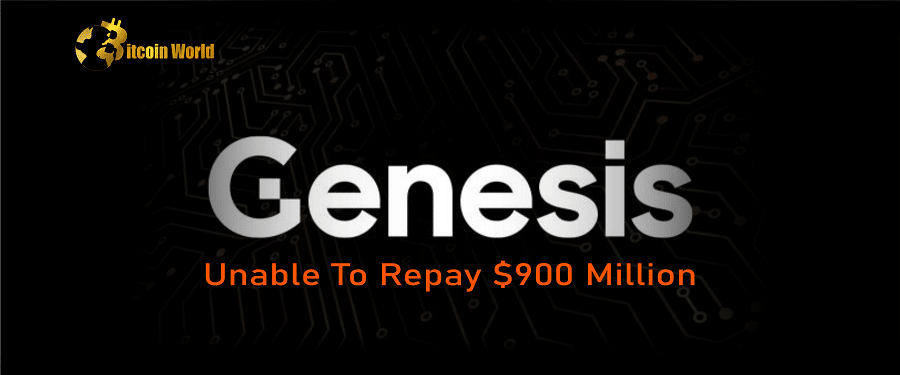The cryptocurrency world is no stranger to volatility, but the recent saga surrounding Genesis, a prominent crypto lending firm, has sent ripples of concern throughout the market. Imagine a staggering $900 million… that’s the amount Genesis reportedly can’t repay, leaving investors and partners like Gemini in a precarious position. What exactly is happening, and could this be another domino in the crypto winter? Let’s dive in.
The Genesis Liquidity Crunch: A $900 Million Question Mark
Genesis, a major player in crypto lending, is facing a severe liquidity crunch. Reports indicate they are unable to return a whopping $900 million to clients, primarily those of Gemini, a cryptocurrency exchange. This situation has ignited fears of bankruptcy and raised serious questions about the health of the broader crypto lending ecosystem.
The FTX Domino Effect: How a Crypto Giant’s Fall Triggered Genesis’s Woes
The roots of Genesis’s current predicament can be traced back to the spectacular collapse of FTX, once a leading cryptocurrency exchange. This event sent shockwaves through the crypto world, exposing vulnerabilities and triggering liquidity issues across various platforms. Here’s a simplified breakdown:
- FTX’s Bankruptcy: FTX’s sudden downfall created a ripple effect of distrust and financial strain in the crypto market.
- Genesis’s Exposure: Genesis, like many other crypto firms, had exposure to FTX, directly or indirectly. The exact nature of this exposure is still unfolding, but it clearly contributed to their liquidity issues.
- Contagion Effect: The FTX crisis triggered a broader “contagion effect,” where financial difficulties in one company spread to others within the interconnected crypto ecosystem. Genesis became one of the most prominent casualties of this contagion.
Gemini and Genesis: A Partnership Under Pressure
Gemini, a well-known crypto exchange founded by the Winklevoss twins, is deeply intertwined with Genesis. Let’s explore this relationship and its implications.
Genesis acts as a key lending partner for Gemini. Through Gemini’s “Earn” program, users could deposit cryptocurrencies and earn interest, much like a traditional savings account. Genesis was the primary entity behind generating these yields.
- Gemini Earn: Gemini offered attractive interest rates (ranging from 0.45% to 8%) to users who deposited crypto in their “Earn” program.
- Genesis as the Engine: Genesis was the engine powering Gemini Earn, using deposited crypto for lending and generating returns.
- $900 Million Owed to Gemini Users: The $900 million Genesis is struggling to repay is largely owed to Gemini Earn users, putting their investments at risk.
- Creditor Negotiations: Gemini is actively engaging with Genesis’s parent company, DCG, to try and recover funds for its users.
Will Genesis Go Bankrupt? Navigating Uncertainty
The big question on everyone’s mind: Is Genesis heading for bankruptcy?
Genesis has publicly stated, “We will not go bankrupt,” and stating that it intends to handle the present issue without filing for bankruptcy, but the situation remains highly uncertain. While they are trying to avoid bankruptcy, the significant liquidity shortfall and ongoing market pressures make it a real possibility.
- Denials vs. Reality: Genesis’s denials of bankruptcy are contrasted by reports of severe liquidity difficulties and the $900 million repayment issue.
- Past Losses: Genesis had already sustained a loss of $1.1 billion as a result of a loan it made to the failed hedge fund Three Arrow Capital (3AC) in the summer of 2016. This prior loss weakened their financial position.
- Withdrawal Freezes: Genesis has already temporarily halted client withdrawals, new loan applications, and repayments, classic signs of a company under severe financial stress.
- Industry Watch: The crypto industry is watching Genesis closely. A Genesis bankruptcy would be another major blow to market confidence and could trigger further contagion.
Lessons from the Genesis Crisis: What Crypto Investors Need to Know
The Genesis situation offers some crucial takeaways for crypto investors:
- Risk in Crypto Lending: High-yield crypto lending platforms, while attractive, carry significant risks. They are not FDIC-insured like traditional bank deposits.
- Counterparty Risk: Always be aware of counterparty risk – the risk that the entities you are dealing with (like Genesis in Gemini Earn’s case) may face financial difficulties.
- Diversification is Key: Don’t put all your eggs in one basket. Diversify your crypto holdings and platforms to mitigate risk.
- Due Diligence: Before using any crypto platform, do your own research. Understand how they generate yields and assess the associated risks.
- Stay Informed: Keep up-to-date with news and developments in the crypto space to make informed decisions.
Conclusion: Navigating the Crypto Winter
The Genesis saga is a stark reminder of the inherent risks within the cryptocurrency market, particularly in the decentralized finance (DeFi) and crypto lending sectors. While the future of Genesis remains uncertain, the situation underscores the importance of caution, due diligence, and risk management for anyone participating in the crypto space. As the industry navigates this challenging period, transparency and robust risk management practices will be crucial for rebuilding trust and ensuring long-term sustainability.
Disclaimer: The information provided is not trading advice, Bitcoinworld.co.in holds no liability for any investments made based on the information provided on this page. We strongly recommend independent research and/or consultation with a qualified professional before making any investment decisions.




